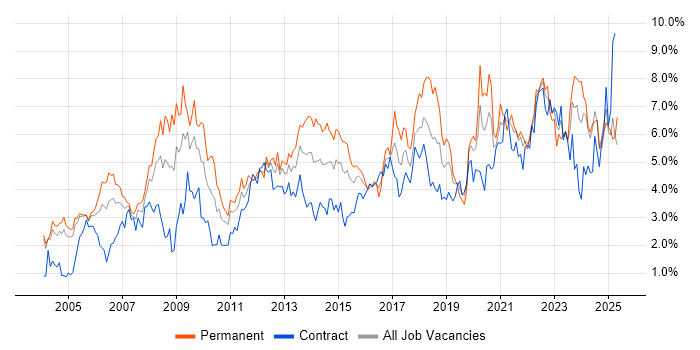Leader
Buckinghamshire > Milton Keynes
The median Leader salary in Milton Keynes is £85,000 per year, according to job vacancies posted during the 6 months leading to 29 May 2025.
The table below provides salary benchmarking and summary statistics, comparing them to the same period in the previous two years.
| 6 months to 29 May 2025 |
Same period 2024 | Same period 2023 | |
|---|---|---|---|
| Rank | 25 | 13 | 44 |
| Rank change year-on-year | -12 | +31 | +3 |
| Permanent jobs requiring a Lead | 12 | 99 | 37 |
| As % of all permanent jobs advertised in Milton Keynes | 5.36% | 9.27% | 4.63% |
| As % of the Job Titles category | 5.80% | 9.75% | 4.89% |
| Number of salaries quoted | 9 | 69 | 27 |
| 10th Percentile | £30,000 | - | £32,500 |
| 25th Percentile | £55,000 | £42,532 | £38,750 |
| Median annual salary (50th Percentile) | £85,000 | £57,500 | £57,500 |
| Median % change year-on-year | +47.83% | - | -8.00% |
| 75th Percentile | £93,250 | £76,250 | £76,875 |
| 90th Percentile | - | £86,250 | £88,500 |
| Buckinghamshire median annual salary | £58,835 | £60,000 | £55,000 |
| % change year-on-year | -1.94% | +9.09% | -8.33% |
All Permanent IT Job Vacancies
Milton Keynes
For comparison with the information above, the following table provides summary statistics for all permanent IT job vacancies in Milton Keynes. Most job vacancies include a discernible job title that can be normalized. As such, the figures in the second row provide an indication of the number of permanent jobs in our overall sample.
| Permanent vacancies in Milton Keynes with a recognized job title | 207 | 1,015 | 756 |
| % of permanent jobs with a recognized job title | 92.41% | 95.04% | 94.50% |
| Number of salaries quoted | 107 | 668 | 518 |
| 10th Percentile | £31,250 | £30,000 | £28,175 |
| 25th Percentile | £41,250 | £40,000 | £34,324 |
| Median annual salary (50th Percentile) | £57,500 | £50,000 | £52,500 |
| Median % change year-on-year | +15.00% | -4.76% | +0.96% |
| 75th Percentile | £68,500 | £60,000 | £67,500 |
| 90th Percentile | £85,800 | £77,500 | £80,000 |
| Buckinghamshire median annual salary | £50,000 | £47,500 | £52,500 |
| % change year-on-year | +5.26% | -9.52% | - |
Lead
Job Vacancy Trend in Milton Keynes
Job postings that featured Lead in the job title as a proportion of all IT jobs advertised in Milton Keynes.

Lead
Salary Trend in Milton Keynes
3-month moving average salary quoted in jobs citing Lead in Milton Keynes.
Lead
Salary Histogram in Milton Keynes
Salary distribution for jobs citing Lead in Milton Keynes over the 6 months to 29 May 2025.
Lead Skill Set
Top 30 Co-occurring Skills and Capabilities in Milton Keynes
For the 6 months to 29 May 2025, Lead job roles required the following skills and capabilities in order of popularity. The figures indicate the absolute number co-occurrences and as a proportion of all permanent job ads across the Milton Keynes region featuring Lead in the job title.
|
|
Lead Skill Set
Co-occurring Skills and Capabilities in Milton Keynes by Category
The follow tables expand on the table above by listing co-occurrences grouped by category. The same employment type, locality and period is covered with up to 20 co-occurrences shown in each of the following categories:
